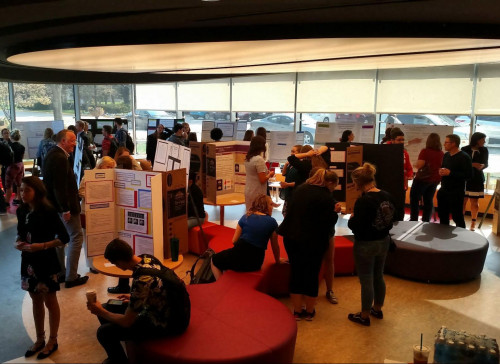Psychology Senior Theses

Every Carthage student is required to submit a senior thesis or capstone project to demonstrate their mastery of their chosen area of study. Students have three tracks toward thesis completion, each practicing the skills students have learned in a different context and culminating with a written document and a presentation.
The tracks to thesis completion are:
Faculty-Guided Research
Students in this track embed themselves in one of the departmental laboratories, immersing themselves in one or more of the ongoing research projects in the lab. They gain experience in every step of the research process, and their thesis takes the form of a research report describing the theories, hypotheses, methods, and results of their laboratory work. Students on this track are encouraged to complete their thesis in the spring of their Junior year or the Fall of their Senior year so that they can present the results of their research at the annual meeting of the Midwestern Psychological Association that happens in April of every year.
Here is a sampling of recent faculty-guided research theses:
- Children’s Understanding of Death and the Afterlife: A Cross-Cultural and Developmental Study
- Think and You’ll Miss It: Magical Misdirection Through Humor
- The Relationship Between Gender, Feelings of Safety, and Perceived Sense of Control in a College Setting
- The Benefits of Reading Fiction on Our Perception of Other People
- Culture and Development of Illness Causation Understanding in Chinese Children
- Mental Processes Utilized by Students During Graphical Interpretation
- The Effects of Behavioral Inhibition on Stress Reactivity to Psychosocial Stress
- Coping with Disasters: Meaning Making in a Case Study of a Religious Leader in Puerto Rico in Response to Crises
- A New Technique for Speech-to-Song Illusion Detection: Timbre Priming
Fieldwork
Students in the Fieldwork track complete 130 hours of field experience at one of our placement sites. Many of these sites are in educational settings, working with children with developmental disabilities, but we also have placements at counseling centers and in a variety of other mental health-focused environments. The thesis in this track is a single-subject intervention study where students test the effectiveness of some interventions with one of their clients in the field.
Here is a sampling of recent fieldwork theses:
- Increasing the Hand Raising and Topical Comments of a Neurodiverse Learner
- Application of Multicomponent Intervention to Enhance Speech in Youth with Selective Mutism
- Working with Sexual Assault Survivors: Can Restorative Yoga Decrease STS Symptoms?
- Thought-Stopping Intervention for Treating Emotion Regulation
- The Cover, Copy, Compare Procedure with a Student with Learning Difficulties
- Coping Skill Training Enhanced with Role-Play in Children with Trauma
- An Emotional Intelligence and Emotional Regulation Intervention for a Student with Emotional Behavioral Disorder
- A Photo Board Alternative and Augmentative Communication Intervention to Decrease Maladaptive Behaviors in a Toddler with Global Delays
- A Mindfulness and Coping Strategy Intervention for Boys with Emotional Regulation Issues
Seminar Class
Every semester the department also offers a seminar class that students can take to complete their thesis. This course takes a different form based on its instructor, but it always involves the application of the skills learned throughout the major. Sometimes students complete projects that test hypotheses using archival data; sometimes they carry out original, team-based research under the guidance of the seminar class instructor.
Here is a sampling of recent seminar class theses:
- Perceived Coping Behavior of Different Genders and Ethnicities during COVID-19
- Olfactory Discrimination Testing in College Aged Students
- Exploring Income and Social Support as Predictors of Pre- and Post- COVID Anxiety
- Analysis of the Impacts of Odor Dimensions on Odor Discrimination Performance
- Scene Priming & Category Variability to Improve Attentional Guidance
- Smell Testing for Use in the Detection of COVID-19 on a College Campus
- Odor Discrimination: How Good are Young Adults at Discriminating Odors?

